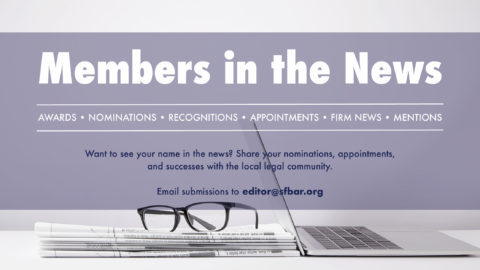

New Law. On January 1, a new California law will take effect. It will require a lawyer to make sure their client understands the implications of California’s legal protections for mediation communications, before the client agrees to mediation. If the client has already agreed to mediation before seeking counsel – by participating in a divorce mediation, or signing a contract with a mediation clause, for instance – then informed consent will be required as soon as possible after engaging counsel.
Senate Bill 954 by State Senator Bob Wieckowski will add a new Evidence Code section 1129, and a new paragraph (a)(3) to the existing section 1122. The new section will require the attorney to obtain their client’s signature on a separate printed disclosure form confirming the client understands the main code section providing mediation confidentiality, Evidence Code section 1119. The informed consent disclosure will need to be in the preferred language of the client. The new law will specify the contents of a sample form which attorneys can elect to use as a way to ensure they have complied with the new requirement (see subdivision d – full text of the new provisions is below.) The form includes a concise 87-word summary of Evidence Code sections 1115-1128 and 703.5. This summary was originally drafted by the Judicial Council in 2005, but never adopted until now.
Consistent Public Policy. For more than half a century, voluntary resolution of disputes has been favored California public policy, and considered most consistent with democratic values of self-determination. The Legislature enacted Labor Code 65, and Evidence Code sections 1152, 1154, and 1152.5, to promote and protect candid off-the-record settlement discussions. The choice to exclude evidence is always difficult and controversial. The protections in each of these sections were eventually eroded by later appellate court decisions. Then in the mid-nineties, the current Evidence Code chapter providing mediation confidentiality – sections 1115-1128 – was drafted and sponsored by the Law Revision Commission. Taking into account the steady weakening of these previous protections, and recognizing that only a tiny fraction of all disputes actually go to trial, the drafters intentionally limited exceptions and favored predictable protections for mediation participants. The Legislature unanimously approved the new chapter. It’s been in effect and largely unchanged since 1998.
Supreme Court Decisions – Cassel. Five subsequent California Supreme Court decisions unanimously upheld this clear but difficult legislative choice – to exclude evidence of mediation communications in later trials. Each decision affirmed the intent to promote the wider public value of candor in mediated settlement negotiations. The last of these five decisions, the Cassel decision in 2011, held that mediation communications were not admissible even when a client was suing their lawyer for alleged malpractice.
Law Revision Commission Study. In 2012, the Legislature directed the Law Revision Commission to study the balance between mediation confidentiality and attorney accountability. After five years of conducting its Study K-402, and public input from hundreds of individuals and dozens of stakeholder organizations, the Commission approved its final recommendation and proposed legislation in late 2017. This would have significantly weakened existing protections. It would have allowed mediation communications to be subpoenaed and used in evidence by lawyers and clients in any later case which alleged lawyer misconduct or over-billing in a mediation context. It would have created the basis to subpoena all participants in the mediation to a) turn over their confidential briefs, offers, emails, and other written communications with the mediator, and to b) have to repeat under oath and cross-examination their oral mediation communications.
Overwhelming Opposition. Reviewing all public feedback, Commission staff explained in Memo 17-52, “The opposition to the Commission’s tentative recommendation can only be described as overwhelming.” A stunning 32 of the 33 affected stakeholder organizations on record opposed the approach the Commission took (Source: http://www.clrc.ca.gov/pub/2017/MM17-52.pdf starting page 6). In a rare joint letter of opposition, the organized plaintiffs’ and defense bars joined to explain “Confidentiality promotes candor, which in turn leads to successful mediation…and the use of mediation is critical to successful out of court resolution of disputes.” (8/31/17 letter) Taken together, the stakeholder organizations on record in opposition represented mediation users, the courts, public agencies, lawyers, and mediators, with millions of hours of direct experience with mediations across all sectors.
Organizations representing the courts, the plaintiffs’ bar, and the defense bar all pointed out that five years of Commission study had produced no reliable evidence that the problem identified happens frequently enough to justify the widespread public costs of making confidentiality unpredictable for those entering mediation. The California Judges Association warned the Commission that “mediators will now, if your proposal is adopted, have to provide an additional explanation to parties…that whatever they or their lawyers say in the process of mediation is no longer confidential…” (8/18/17 letter) The committee reviewing the proposed legislation for the Judicial Council stated its unanimous opposition. Due to this overwhelming opposition, no member of the Legislature would agree to carry the Commission’s proposed bill in the 2017-2018 session. The choice to keep California’s current protections seemed clear.
Alternative Approach. Senator Wieckowski still saw a need to be sure clients understood the implications of excluding mediation communications from later proceedings. He especially wanted to ensure that clients understood they could not use mediation communications if they later wanted to sue their lawyers. April Bird, the main aide handling this bill for the Senator, worked diligently with dozens of diverse stakeholder organizations around the state to craft a consensus bill that could be enacted. These included the State Bar, California Lawyers Association, Judicial Council, California Dispute Resolution Council, Conference of California Bar Associations, Consumer Attorneys of California, California Defense Council, California Judges Association, Consortium for Children, and many others. Drafting and redrafting the bill through four major amendments, the bill was eventually adopted unanimously by the Legislature and signed into law.
The central aim of the bill is summarized in the new sample form by the following sentence: “I, _____________ [Name of Client], understand that, unless all participants agree otherwise, no oral or written communication made during a mediation, or in preparation for a mediation, including communications between me and my attorney, can be used as evidence in any subsequent noncriminal legal action including an action against my attorney for malpractice or an ethical violation.” Most of the time, disputants do settle their disputes in mediation. They sign settlements, and are able to go on with their lives. An important provision in the new law (subsection e) makes clear that if one of the attorneys fails to obtain the required consent form, it might be grounds for disciplining that attorney, but it does not create a new basis to try to later overturn the parties’ settlement.
Full Text of New Law. The new Evidence Code section 1129, and the new paragraph 1122 (a)(3), will read as follows.
(b) An attorney who is retained after an individual agrees to participate in the mediation or mediation consultation shall, as soon as reasonably possible after being retained, comply with the printed disclosure and acknowledgment requirements described in subdivision (a).
(c) The printed disclosure required by subdivision (a) shall:
(1) Be printed in the preferred language of the client in at least 12-point font.
(2) Be printed on a single page that is not attached to any other document provided to the client.
(3) Include the names of the attorney and the client and be signed and dated by the attorney and the client.
(d) If the requirements in subdivision (c) are met, the following disclosure shall be deemed to comply with the requirements of subdivision (a):
Mediation Disclosure Notification and Acknowledgment
To promote communication in mediation, California law generally makes mediation a confidential process. California’s mediation confidentiality laws are laid out in Sections 703.5 and 1115 to 1129, inclusive, of the Evidence Code. Those laws establish the confidentiality of mediation and limit the disclosure, admissibility, and a court’s consideration of communications, writings, and conduct in connection with a mediation. In general, those laws mean the following:
This means that all communications between you and your attorney made in preparation for a mediation, or during a mediation, are confidential and cannot be disclosed or used (except in extremely limited circumstances), even if you later decide to sue your attorney for malpractice because of something that happens during the mediation.
I, _____________ [Name of Client], understand that, unless all participants agree otherwise, no oral or written communication made during a mediation, or in preparation for a mediation, including communications between me and my attorney, can be used as evidence in any subsequent noncriminal legal action including an action against my attorney for malpractice or an ethical violation.
NOTE: This disclosure and signed acknowledgment does not limit your attorney’s potential liability to you for professional malpractice, or prevent you from (1) reporting any professional misconduct by your attorney to the State Bar of California or (2) cooperating with any disciplinary investigation or criminal prosecution of your attorney.
[Name of Client] [Date signed]
[Name of Attorney] [Date signed]
(e) Failure of an attorney to comply with this section is not a basis to set aside an agreement prepared in the course of, or pursuant to, a mediation.
[1122. (a) A communication or a writing, as defined in Section 250, that is made or prepared for the purpose of, or in the course of, or pursuant to, a mediation or a mediation consultation, is not made inadmissible, or protected from disclosure, by provisions of this chapter if any of the following conditions are satisfied:…]
(3) The communication, document, or writing is related to an attorney’s compliance with the requirements described in Section 1129 and does not disclose anything said or done or any admission made in the course of the mediation, in which case the communication, document, or writing may be used in an attorney disciplinary proceeding to determine whether the attorney has complied with Section 1129.
About the author:
Ron Kelly played a central role in crafting SB 954. He worked closely with Senator Wieckowski’s office, the Assembly Judiciary Committee, and dozens of stakeholder organizations around the state. He had previously initiated and guided the formation of California’s main Evidence Code chapter defining and governing mediation (sections 1115-1128). In 1996 and 1997, at the request of the sponsoring Law Revision Commission, he served as the lead expert advisor in drafting this chapter. Background on the formation of California’s mediation laws is available at .
© 2018, Ron Kelly. Permission is granted to reprint and post this article as written.

July 7, 2023

June 5, 2023

May 1, 2023